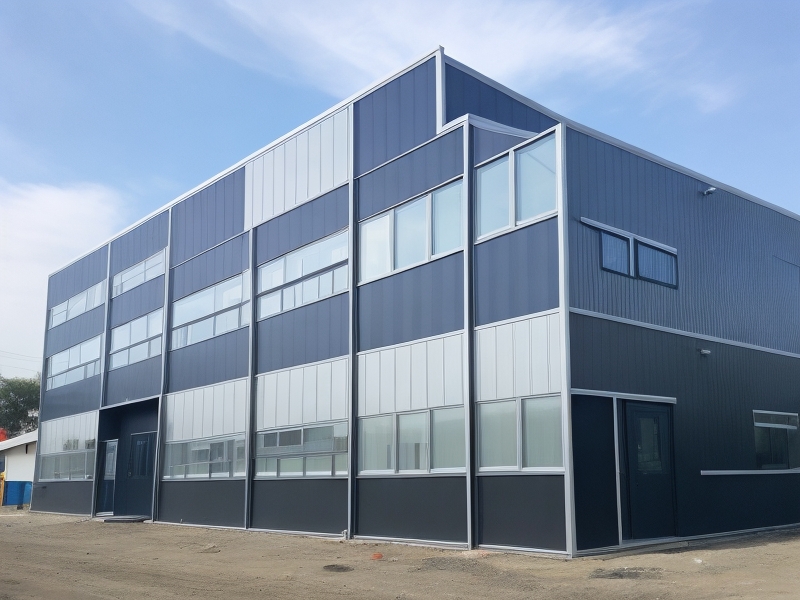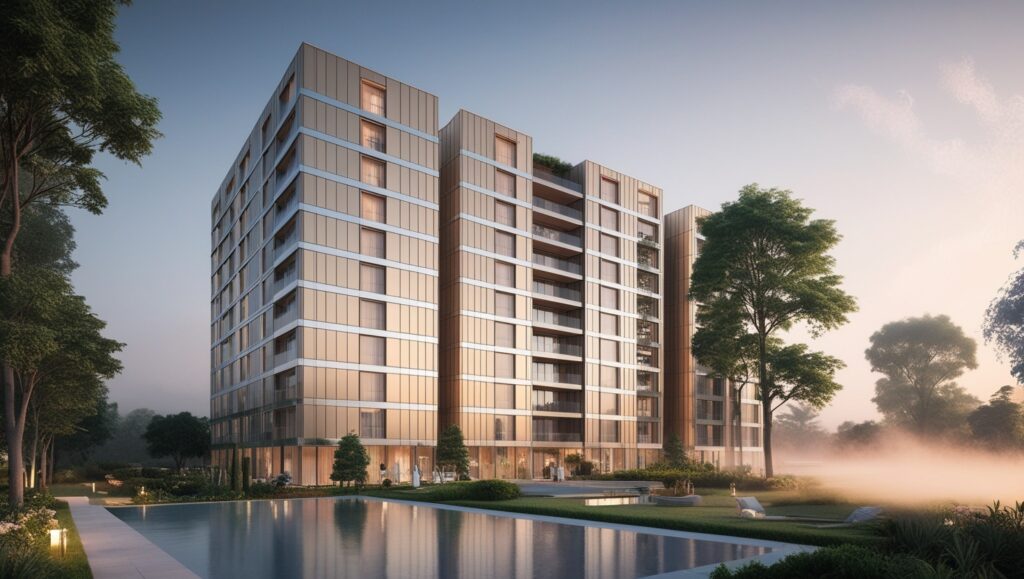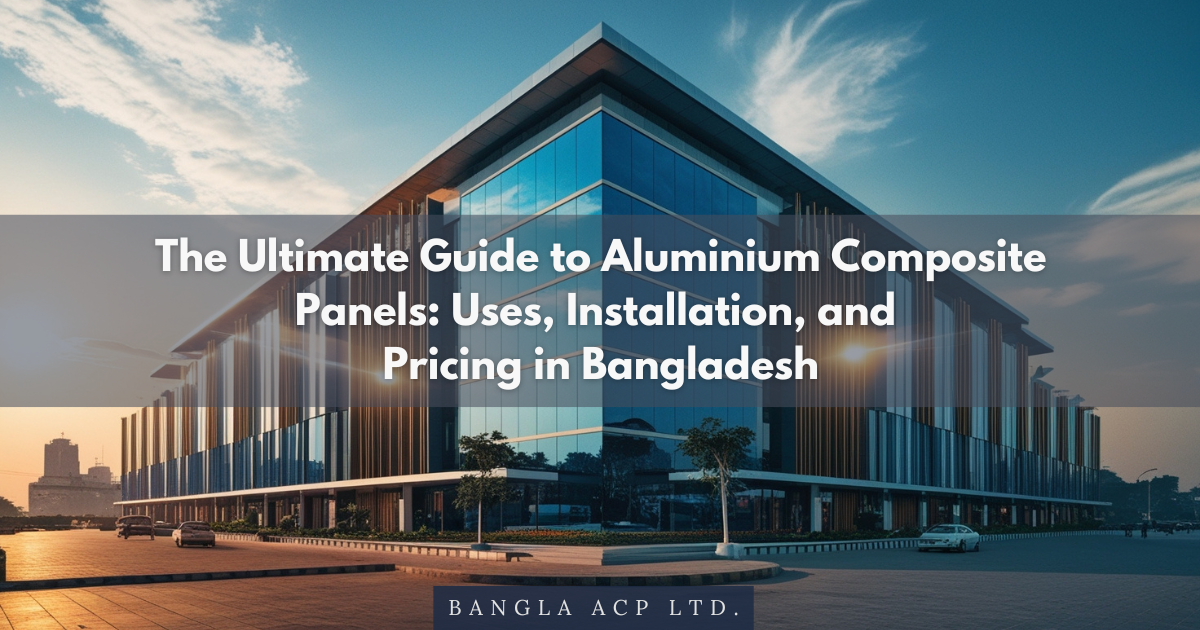In recent years, aluminium composite panels have become a popular choice in construction and architecture. These magic materials are strong, lightweight, and attractive.
In this ultimate guide, we will cover everything you need to know about aluminium composite panels, from their basic structure to their applications and prices in Bangladesh.
What is an Aluminium Composite Panel?
Aluminium composite panels, also known as ACP, are flat panels made of two thin aluminium sheets bonded to a non-aluminium core.
This sandwich-like structure makes it a lightweight and solid material.
Aluminium composite panels were first developed in 1960s and since then it has become a part of modern architecture and construction projects all over the world.
The Journey of Aluminium: From Raw Material to ACP
A. How aluminium is obtained
Aluminium, the primary component of aluminium composite panels, is extracted from bauxite ore through a process called electrolysis. This method involves several steps:
- Mining bauxite ore
- Refining the ore to produce alumina (aluminium oxide)
- Smelting the alumina to produce pure aluminium
B. Main characteristics of aluminium
Aluminium possesses several unique properties that make it ideal for use in composite panels:
- Lightweight: Aluminium is remarkably light, making it easy to transport and install.
- Corrosion resistance: It naturally forms a protective oxide layer, preventing rust and decay.
- Durability: Aluminium is strong and can withstand various weather conditions.
- Versatility: It can be easily shaped, cut, and formed into different designs.
These characteristics contribute to the popularity of aluminium composite panels in various applications.
Types of Aluminium Composite Panels
Aluminium composite panels come in different types, depending on their core material, surface finish, and intended application.
A. Based on core material
- Polyethylene (PE) core: The most common type, suitable for general purposes
- Fire-resistant (FR) core: Designed to meet stricter fire safety standards
- Honeycomb core: Offers superior strength-to-weight ratio
B. Based on the surface finish
- Solid colors
- Metallic finishes
- Wood grain patterns
- Stone textures
- Mirror finishes
C. Based on application
- Exterior cladding panels
- Interior decorative panels
- Signage and advertising boards
- Transportation panels (for vehicles, trains, etc.)
Finishes and Coatings for Aluminium Composite Panels
The surface finish of aluminium composite panels plays a crucial role in their appearance and durability. Here are some common coating options:
A. PVDF (Fluorinated polyvinyl)
PVDF coatings offer excellent resistance to weathering, UV radiation, and chemicals. They maintain color and gloss for extended periods, making them ideal for exterior applications.
B. FEVE (Lumiflon)
FEVE coatings provide superior durability and color retention. They are often used in high-end architectural projects where long-lasting performance is crucial.
C. HDPE (High Durability Polyester)
HDPE coatings offer good weathering resistance and are more cost-effective than PVDF or FEVE. They are suitable for less demanding applications or areas with milder climates.
D. Other finishing options
- Anodized finishes
- Powder coatings
- Nano-coatings for self-cleaning properties
Applications of Aluminium Composite Panels

Aluminium composite panels are incredibly versatile and can be used in various industries. Here are some common applications:
A. Exterior applications
- Building facades
- Roof cladding
- Canopies and awnings
- Petrol station cladding
B. Interior applications
- Wall cladding
- Ceiling panels
- Partition walls
- Column covers
C. Signage and advertising
- Billboards
- Shop signs
- Exhibition displays
D. Transportation
- Vehicle body panels
- Train interiors
- Ship cabins
E. Industrial uses
- Clean room partitions
- Machine enclosures
- Acoustic barriers
For more information on aluminium composite panel uses, read our article – How to Choose the Best Aluminium Composite Panel for Your Project.
Installation Guide for Aluminium Composite Panels
Proper installation of aluminium composite panels is crucial for their performance and longevity. Here’s a general guide to the installation process:
A. Pre-installation considerations
- Site assessment
- Panel sizing and cutting
- Substrate preparation
B. Step-by-step installation process
- Marking and layout
- Installing support structures
- Applying adhesive or mechanical fasteners
- Placing and aligning panels
- Sealing joints and edges
C. Tools and equipment required
- Cutting tools (circular saw, router)
- Drilling equipment
- Measuring tools
- Safety gear
D. Safety precautions
- Wear protective equipment
- Follow the manufacturer’s guidelines
- Ensure proper ventilation when using adhesives
Bonding Techniques: How to Glue Composite Panels
Proper bonding is important for the secure installation of aluminium composite panels. Here’s what you need to know:
A. Types of adhesives suitable for ACP
- Structural silicone sealants
- Polyurethane adhesives
- Epoxy-based adhesives
B. Surface preparation
- Clean surfaces thoroughly
- Use appropriate primers if recommended
- Ensure surfaces are dry and free from contaminants
C. Application methods
- Bead application
- Spread application
- Spray application (for some adhesive types)
D. Curing and post-installation care
- Allow proper curing time as per adhesive specifications
- Avoid stress on bonds during curing
- Clean excess adhesive promptly
Advantages of Aluminium Composite Panels

Aluminium composite panels offer numerous benefits, making them a popular choice in construction and design:
A. Aesthetic benefits
- Wide range of colors and finishes
- Smooth, flat surface
- Ability to create curved and complex shapes
B. Structural advantages
- Lightweight yet strong
- Excellent rigidity
- Good insulation properties
C. Cost-effectiveness
- Lower installation costs due to lightweight nature
- Reduced structural support requirements
- Long lifespan with minimal maintenance
D. Environmental considerations
- Recyclable materials
- Energy-efficient production process
- Contribute to building energy efficiency
Read our full article on the Advantages of Aluminium Composite Panels (ACP) for more information.
Technical Specifications of Aluminium Composite Panels
Knowing the technical aspects of aluminium composite panels is important for proper selection and application:
A. Standard dimensions
- Typical panel sizes: 4” x 8”
- Custom sizes available on request
B. Weight and density
- Average weight: 3.5 to 5.5 kg/m² (depending on thickness)
- Density: approximately 1.3 to 1.45 g/cm³
C. Thermal properties
- Thermal expansion coefficient: 1.5 x 10⁻⁵ /°C
- R-value: varies depending on thickness and core material
D. Fire resistance
- FR grade panels meet various international fire safety standards
- Fire ratings vary depending on core material and thickness
E. Sound insulation
- Sound reduction index: approximately 25-27 dB (for 4mm panels)
Aluminium Composite Panel Thickness Options
Aluminium composite panels are available in various thicknesses to suit different applications:
A. Common thickness ranges
- 2mm – 6mm for standard applications
- 3mm and 4mm are most commonly used
B. Choosing the right thickness for different applications
- 2mm – 3mm: Suitable for interior applications and signage
- 3mm – 4mm: Ideal for most exterior cladding projects
- 5mm – 6mm: Used in high-impact areas or where extra rigidity is required
The thickness of aluminium composite panels manufactured at Bangla ACP ranges from 2.5mm – 6mm.
The most common thickness of ACP Sheets in Bangladesh is 3mm or 4mm Aluminium Composite Panels.
Contact us for a better consultation about thickness for your next project.
Aluminium Composite Panels in Bangladesh
The use of aluminium composite panels has grown significantly in Bangladesh’s construction sector:
A. Market overview
- Increasing demand due to rapid urbanization
- Growing awareness of ACP benefits among architects and builders
B. Popular brands and suppliers
Many companies in Bangladesh provide ACP panels. Some companies import ACP Sheets from abroad, while others manufacture locally in Bangladesh.
Bangla ACP Ltd. is the leading manufacturing company of aluminum composite panels in Bangladesh, producing world-class ACP sheets with global stands to meet the local construction demand for commercial buildings and residential projects.
C. Local manufacturing vs. imports
Among all the local manufacturing companies in Bangladesh, Bangla ACP stands out for its high-quality ACP Sheets compared to other manufacturers.
Additionally, Aluminium Composite Panels produced in the Bangla ACP factory are of higher quality, more durable, and more affordable than those of any other ACP Suppliers and importers in Bangladesh.
Pricing Guide: Aluminium Composite Panels Price in Bangladesh
The cost of aluminium composite panels in Bangladesh varies based on several factors:
A. Factors affecting ACP prices
- Raw material costs (especially aluminium)
- Panel quality and brand
- Thickness and core material
- Surface finish and coating type
B. Price ranges for different types and qualities
- Standard PE core panels: Contact us for current prices
- Fire-resistant (FR) core panels: Generally 20-30% higher than PE core
- High-end finishes (e.g., PVDF coated): Premium pricing
C. Comparison with alternative materials
- Generally more cost-effective than solid aluminium sheets
- Competitive with other cladding materials like HPL or fiber cement
D. Tips for cost-effective purchasing
- Compare quotes from multiple suppliers
- Consider bulk purchases for large projects
- Balance quality with budget requirements
Bangla ACP manufactures aluminium composite panels with the highest quality of imported aluminium, maintains the best quality control process during production, provides customized solutions to clients, and after-sales services are plus.
Contact us with your requirements and project brief, we will provide you the premium quality of products within a budget range.
FAQ Section
What is the life expectancy of aluminum composite panels?
Aluminium composite panels can last 20-30 years or more with proper installation and maintenance.
How long does an aluminum composite panel last?
The lifespan depends on various factors such as quality, installation, and environmental conditions. Generally, it can last 20-30 years or more.
What is the difference between ACM and ACP?
ACM (Aluminium Composite Material) and ACP (Aluminium Composite Panel) are essentially the same. The terms are often used interchangeably in the industry.
Which factors impact ACP board cost?
The main factors affecting ACP cost include raw material prices, panel thickness, core material, surface finish, brand, and quantity ordered.
Are aluminum composite panels fire-resistant?
Standard PE core panels are not fire-resistant. However, FR (fire-resistant) grade panels that meet various fire safety standards are available.
Can aluminum composite panels be recycled?
Yes, aluminium composite panels can be recycled. The aluminium sheets can be separated from the core and recycled.
How do I maintain and clean aluminum composite panels?
Regular cleaning with mild soap and water is usually sufficient. Avoid abrasive cleaners or tools that might scratch the surface.
Are aluminum composite panels suitable for all climates?
Yes, aluminium composite panels can be used in various climates. However, the coating and core material choice may vary depending on specific climate conditions.
Can aluminum composite panels be used for roofing?
While primarily used for wall cladding, specially designed aluminium composite panels can be used for certain roofing applications.
How do aluminum composite panels compare to other cladding materials?
Aluminium composite panels offer a good balance of aesthetics, durability, and cost-effectiveness compared to materials like solid aluminium, stone, or glass cladding.
Conclusion
Aluminium composite panels have changed the face of modern architecture and construction. Their versatility, durability, and looks make them suitable for many applications. As the construction industry in Bangladesh is growing, the demand for aluminium composite panels will increase.
Whether you are an architect, engineer, or property owner, knowing the properties and applications of aluminium composite panels will help you make better decisions for your projects. As technology advances, we will see more innovative uses and improvements in aluminium composite panel design and performance.
By choosing the right type of aluminium composite panel for your project, you can enhance the looks, functionality, and value of your building. Consider climate, budget, and local regulations when selecting and installing these versatile materials.
Resources for Further Reading
Glossary of Terms
- ACP: Aluminium Composite Panel
- ACM: Aluminium Composite Material
- PVDF: Polyvinylidene Fluoride (a type of coating)
- FEVE: Fluoroethylene Vinyl Ether (another high-performance coating)
- FR: Fire Resistant
- PE: Polyethylene (standard core material)
